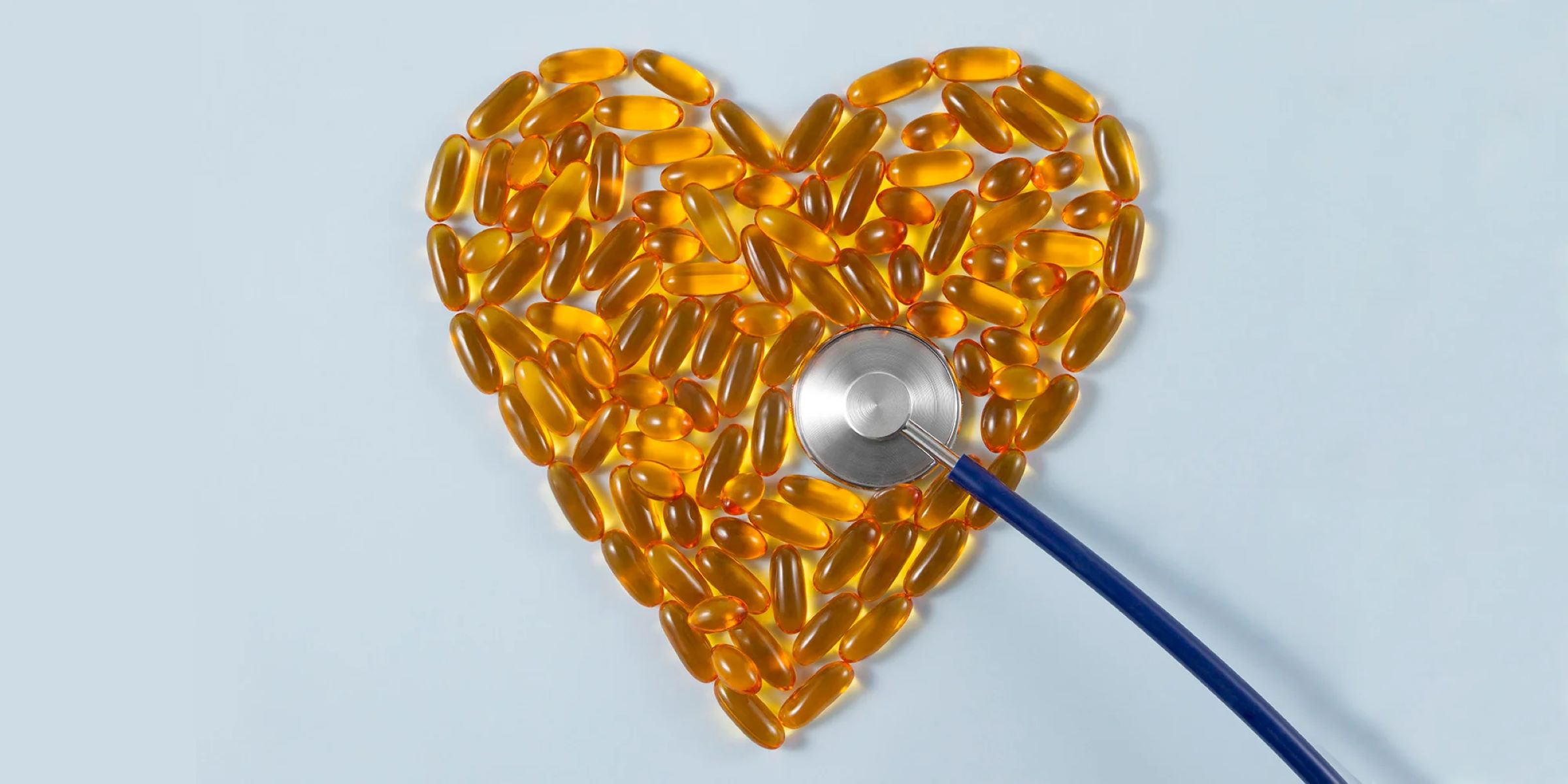Home>Misc>Featured>How Much Omega 3 For Athletic Performance


Featured
How Much Omega 3 For Athletic Performance
Modified: January 2, 2024
Discover how much omega 3 you need to enhance athletic performance. Our expert-featured guide reveals the optimal dosage for athletes. Take your performance to the next level!
Introduction
Welcome to the world of athletic performance! Whether you are a professional athlete, a dedicated fitness enthusiast, or someone who simply enjoys physical activity, you know the importance of optimizing your performance. One factor that can significantly contribute to your success is nutrition – specifically, the inclusion of omega-3 fatty acids in your diet.
Omega-3 fatty acids are a type of polyunsaturated fat that are considered essential for overall health and well-being. They play a crucial role in a wide range of bodily functions, including brain health, cardiovascular health, and reducing inflammation. But did you know that omega-3 fatty acids can also have a positive impact on your athletic performance?
Omega-3s have been shown to enhance several aspects of athletic performance, such as improving endurance, reducing exercise-induced inflammation, and supporting muscle recovery. These benefits can give athletes a competitive edge and help them reach their peak performance.
In this article, we will explore the various benefits of omega-3 fatty acids for athletic performance. We will also discuss the recommended daily intake of omega-3s, sources of omega-3s for athletes, and the appropriate dosage for different types of athletes. Additionally, we will delve into the topic of supplementing with omega-3s to further enhance athletic performance.
Before we dive into the details, it is important to note that while omega-3s can have numerous benefits for athletes, they are not a magic solution for achieving athletic success. Proper training, rest, and a well-balanced diet are still crucial factors in overall performance. However, incorporating omega-3s into your nutrition plan can provide that extra edge for reaching your goals.
So, let’s explore the world of omega-3 fatty acids and discover how they can elevate your athletic performance to new heights!
Benefits of Omega-3 for Athletic Performance
When it comes to athletic performance, optimizing every aspect of your training and recovery is essential. Adding omega-3 fatty acids to your diet can provide a myriad of benefits that can help improve your athletic performance. Let’s take a closer look at some of these benefits:
- Improved Endurance: Omega-3 fatty acids have been shown to increase blood flow and oxygen delivery to muscles during exercise. This can enhance your endurance and stamina, allowing you to push harder and perform longer without experiencing fatigue.
- Reduced Inflammation: Intense physical activity can cause inflammation in the body, leading to muscle soreness and slower recovery. Omega-3s have powerful anti-inflammatory properties that can help reduce exercise-induced inflammation. This can result in faster recovery times and reduced post-workout muscle soreness.
- Enhanced Muscle Recovery: Omega-3s play a vital role in muscle protein synthesis, which is crucial for repairing and rebuilding muscle fibers after strenuous exercise. By promoting faster muscle recovery, omega-3s can help athletes bounce back quicker from intense training sessions and minimize the risk of overuse injuries.
- Support for Joint Health: Athletes put significant stress on their joints through repetitive motions and high-impact activities. Omega-3s have been shown to have a positive impact on joint health by reducing joint stiffness and improving overall mobility. This can help athletes perform at their best and prevent long-term joint damage.
- Brain Health and Cognitive Function: Optimal cognitive function is essential for making split-second decisions, focusing, and maintaining motivation during training and competition. Omega-3 fatty acids, particularly DHA (docosahexaenoic acid), are critical for brain health and can support cognitive function, memory, and mood stability.
The benefits of omega-3 fatty acids extend far beyond athletic performance. They also have a positive impact on heart health, immune function, and overall well-being, which are crucial for athletes who put their bodies under intense physical stress.
It’s worth noting that the benefits of omega-3s for athletic performance are most pronounced when they are consumed as part of a well-balanced diet. Including omega-3-rich foods and supplementing when necessary can help athletes unlock their full potential and perform at their best.
Recommended Daily Intake of Omega-3 for Athletes
Now that we understand the benefits of omega-3 fatty acids for athletic performance, it’s important to know how much you should be consuming to reap these benefits. The recommended daily intake of omega-3s for athletes can vary depending on several factors, including age, sex, body weight, and activity level.
The two primary omega-3 fatty acids that are of interest for athletes are EPA (eicosapentaenoic acid) and DHA (docosahexaenoic acid). These are found in fatty fish, such as salmon, mackerel, and sardines. The general guideline for omega-3 intake is to aim for a combined EPA and DHA intake of 250-500 milligrams per day.
For athletes who have higher caloric needs and engage in intense training, a higher omega-3 intake may be beneficial. Some experts recommend consuming up to 1 gram of combined EPA and DHA per day to support optimal physical performance and recovery.
It’s important to note that omega-3 supplements can be a convenient and reliable source of these essential fatty acids. However, it’s always recommended to consult with a healthcare professional or registered dietitian before starting any supplementation regimen to ensure proper dosage and safety.
Additionally, if you are vegetarian or vegan and don’t consume fish or fish oils, you can still obtain omega-3s through plant-based sources. Flaxseeds, chia seeds, walnuts, and certain algae-based supplements are rich in ALA (alpha-linolenic acid), which is a type of omega-3 fatty acid. However, it’s important to understand that the conversion of ALA to EPA and DHA in the body is limited, so additional supplementation may be necessary for optimal omega-3 levels.
Remember that individual needs may vary, and it’s important to listen to your body. If you have specific dietary requirements or health conditions, it’s best to consult with a healthcare professional or registered dietitian who can provide personalized recommendations tailored to your needs.
By meeting your recommended daily intake of omega-3 fatty acids, you can support your athletic performance, enhance your recovery process, and improve your overall well-being.
Sources of Omega-3 for Athletes
When it comes to obtaining omega-3 fatty acids, it’s important to incorporate a variety of food sources into your diet. Here are some excellent sources of omega-3s for athletes:
- Fatty Fish: Fatty fish, such as salmon, mackerel, trout, and sardines, are rich in both EPA and DHA. These marine sources are among the best natural sources of omega-3s and are easily absorbed by the body. Aim to include fatty fish in your diet at least twice a week to meet your omega-3 needs.
- Flaxseeds: Flaxseeds are a plant-based source of omega-3s, specifically alpha-linolenic acid (ALA). They can be ground and added to smoothies, yogurt, oatmeal, or used as an ingredient in baked goods. However, it’s important to note that the conversion of ALA to EPA and DHA in the body is limited, so incorporating additional sources of omega-3s may be necessary.
- Chia Seeds: Chia seeds contain a good amount of ALA and provide other nutritional benefits, such as fiber and protein. Add chia seeds to your overnight oats, smoothies, or yogurt for a boost of omega-3s.
- Walnuts: Walnuts are a great plant-based source of omega-3s. They are also rich in antioxidants and provide a satisfying crunch to salads, oatmeal, or as a snack on their own.
- Algal Oil: Algal oil is derived from algae and is a popular vegan source of EPA and DHA. It can be found in supplement form and is a suitable alternative for individuals who don’t consume fish or fish oils.
- Fortified Foods: Some food products, such as certain brands of eggs, milk, and yogurt, may be fortified with omega-3 fatty acids. Check the labels to ensure that the product includes EPA and DHA for maximum benefit.
It’s important to prioritize getting your omega-3 fatty acids from whole food sources whenever possible. Whole foods provide a wide range of nutrients and benefits beyond omega-3s, supporting your overall health and athletic performance.
However, for individuals who have limited access to omega-3-rich foods or prefer a more convenient option, omega-3 supplements can be a helpful addition. Omega-3 supplements typically come in the form of fish oil capsules or algal oil capsules for vegans and vegetarians. Always choose high-quality supplements and consult with a healthcare professional or registered dietitian to determine the right dosage for your specific needs.
By incorporating a variety of omega-3-rich foods into your diet or using supplements, you can ensure that you are meeting the recommended intake and optimizing your athletic performance.
Omega-3 Dosage for Different Types of Athletes
The optimal dosage of omega-3 fatty acids for athletes can vary depending on factors such as activity level, training intensity, body weight, and individual needs. Here’s a general guideline for omega-3 dosage based on different types of athletes:
- Endurance Athletes: Endurance athletes, such as runners, cyclists, and swimmers, typically engage in prolonged, moderate to high-intensity activities. For these athletes, a daily dosage of 1-1.5 grams of combined EPA and DHA is often recommended. This dosage can help support cardiovascular health, reduce inflammation, and enhance endurance performance.
- Strength and Power Athletes: Strength and power athletes, including weightlifters and sprinters, focus on short bursts of intense activity and muscle development. While omega-3s are beneficial for overall health, specific dosage recommendations for this group may vary. Aim for a daily dosage of 500-1000 milligrams of combined EPA and DHA to support muscle recovery and reduce inflammation caused by heavy weightlifting or high-intensity workouts.
- Team Sport Athletes: Team sport athletes, such as soccer players, basketball players, and football players, require a combination of endurance, strength, and quick bursts of energy. For these athletes, a daily dosage of 500-1000 milligrams of combined EPA and DHA is recommended to support overall performance, reduce inflammation, and aid in muscle recovery.
- Combat Sports Athletes: Combat sports athletes, such as MMA fighters and boxers, undergo intense training that can result in significant inflammation, muscle damage, and oxidative stress. It is recommended that combat sports athletes consume a daily dosage of 1-1.5 grams of combined EPA and DHA to support recovery, reduce inflammation, and protect against exercise-induced oxidative stress.
- Adaptive Athletes: Adaptive athletes competing in para-sports or with disabilities may have unique nutritional needs. Dosage recommendations should be tailored to individual requirements and, in some cases, consulted with a healthcare professional or registered dietitian to determine the appropriate dosage based on specific needs.
It’s important to keep in mind that these dosage recommendations are general guidelines and may need to be adjusted based on individual factors. Additionally, it’s always advisable to consult with a healthcare professional or registered dietitian who can provide personalized recommendations based on your specific needs, overall health, and training goals.
Remember, consistency is key when it comes to omega-3 supplementation. It’s recommended to take omega-3 supplements with meals to enhance absorption and minimize any potential digestive discomfort.
By following the appropriate omega-3 dosage for your athletic category, you can help optimize your performance, support muscle recovery, and enhance overall well-being.
Supplementing with Omega-3 for Enhanced Athletic Performance
While obtaining omega-3 fatty acids from whole food sources is ideal, many athletes may find it challenging to consistently incorporate enough omega-3-rich foods into their diet. In such cases, supplementation can be a convenient and effective way to ensure an adequate intake of omega-3s. Here are some key points to consider when supplementing with omega-3 for enhanced athletic performance:
- Choose High-Quality Supplements: When considering omega-3 supplements, opt for high-quality products that are third-party tested for purity, potency, and freshness. Look for supplements that provide a concentrated amount of EPA and DHA, as these are the active forms of omega-3s.
- Mind the Dosage: It’s crucial to follow the recommended dosage provided on the supplement label or as advised by a healthcare professional. Avoid exceeding the recommended dosage, as excessive omega-3 intake can have adverse effects.
- Consider Your Diet: Remember that omega-3 supplements are meant to supplement, not replace, a well-rounded diet. Focus on incorporating omega-3-rich foods into your meals and use supplements as a way to fill in the gaps if necessary.
- Timing Matters: Taking omega-3 supplements with meals can help enhance absorption and minimize any potential gastrointestinal discomfort. However, it’s best to follow the specific instructions provided by the supplement manufacturer.
- Monitor Your Body’s Response: Each individual may respond differently to omega-3 supplementation, both in terms of benefits and tolerability. Pay attention to how your body responds to the supplement and consult with a healthcare professional if you have any concerns or questions.
- Remember the Big Picture: Omega-3 supplementation should be seen as part of a comprehensive approach to athletic performance. It’s vital to take into account other factors such as adequate training, proper rest, and a well-balanced diet to optimize overall performance.
It’s important to note that omega-3 supplements are not a substitute for a healthy diet and lifestyle. They should be used as part of an overall nutrition plan tailored to your individual needs and goals.
Lastly, if you have specific dietary restrictions or medical conditions, it’s crucial to consult with a healthcare professional or registered dietitian before beginning any supplementation regimen to ensure it is appropriate for your situation.
By supplementing with omega-3s in a strategic and informed manner, you can enhance your athletic performance, support your body’s recovery processes, and promote overall well-being.
Potential Side Effects and Precautions
While omega-3 fatty acids are generally safe and well-tolerated, it’s important to be aware of potential side effects and take necessary precautions. Here are some key considerations to keep in mind:
- Possible Blood Thinning: Omega-3s have natural blood-thinning properties, which can be beneficial for cardiovascular health. However, if you are taking blood-thinning medications or have a bleeding disorder, it’s essential to consult with a healthcare professional before starting omega-3 supplementation to avoid any potential interactions or complications.
- Digestive Issues: Some individuals may experience mild gastrointestinal disturbances, such as diarrhea, bloating, or indigestion, when taking omega-3 supplements. To minimize these effects, it’s recommended to take supplements with meals or try different brands or forms of omega-3s to find the one that works best for you.
- Quality and Purity: Omega-3 supplements can vary in quality and purity. To ensure you are getting a reliable and safe product, look for supplements that are third-party tested for purity, potency, and freshness. These tests can ensure that the supplement is free from contaminants such as heavy metals, PCBs, and toxins.
- Interactions with Medications: Omega-3s may interact with certain medications, including blood thinners, antiplatelet drugs, and certain cholesterol-lowering medications. Consult with your healthcare provider if you are taking any medications to determine if omega-3 supplementation is appropriate for you.
- Pregnancy and Breastfeeding: Omega-3 supplementation is generally considered safe during pregnancy and breastfeeding, as long as the recommended dosage is followed. However, it’s always advisable to consult with a healthcare professional before starting any supplementation regimen during this time to ensure it is safe and appropriate for your specific situation.
- Allergies: If you have allergies or sensitivities to fish or seafood, it’s important to choose omega-3 supplements derived from algae or other plant-based sources instead. Always check the product labels to ensure they are free from any allergens that may cause an adverse reaction.
It’s important to emphasize that these precautions should not discourage the use of omega-3 supplementation. Instead, they are meant to empower individuals to make informed decisions and prioritize their health and well-being.
If you have any concerns or questions about omega-3 supplementation or its potential side effects, it’s advisable to consult with a healthcare professional or registered dietitian who can provide personalized advice based on your unique circumstances.
By taking the necessary precautions and being mindful of any potential side effects, you can safely and effectively incorporate omega-3s into your athletic performance regimen.
Conclusion
Incorporating omega-3 fatty acids into your diet can have a profound impact on your athletic performance and overall well-being. The benefits of omega-3s, such as improved endurance, reduced inflammation, enhanced muscle recovery, and support for joint health, make them a valuable addition to any athlete’s nutrition plan.
Whether you choose to obtain omega-3s from fatty fish, flaxseeds, chia seeds, walnuts, or through supplements, it’s important to prioritize a well-rounded diet that includes a variety of omega-3-rich foods. Additionally, understanding the recommended daily intake and dosage for different types of athletes can help you tailor your omega-3 intake to your specific needs.
As with any dietary changes or supplementation, it’s crucial to take into account individual factors such as medical conditions, medication use, and dietary restrictions. Always consult with a healthcare professional or registered dietitian to ensure that omega-3 supplementation is safe and appropriate for your specific circumstances.
Remember, omega-3 supplementation should be seen as part of a comprehensive approach to your athletic performance. It is not a magic solution, but rather a valuable tool to aid in enhancing your endurance, recovery, and overall athletic capabilities.
By incorporating omega-3 fatty acids into your nutrition plan, whether through whole foods or supplements, and taking the necessary precautions, you can set yourself up for success on your athletic journey and optimize your performance in pursuit of your goals.









